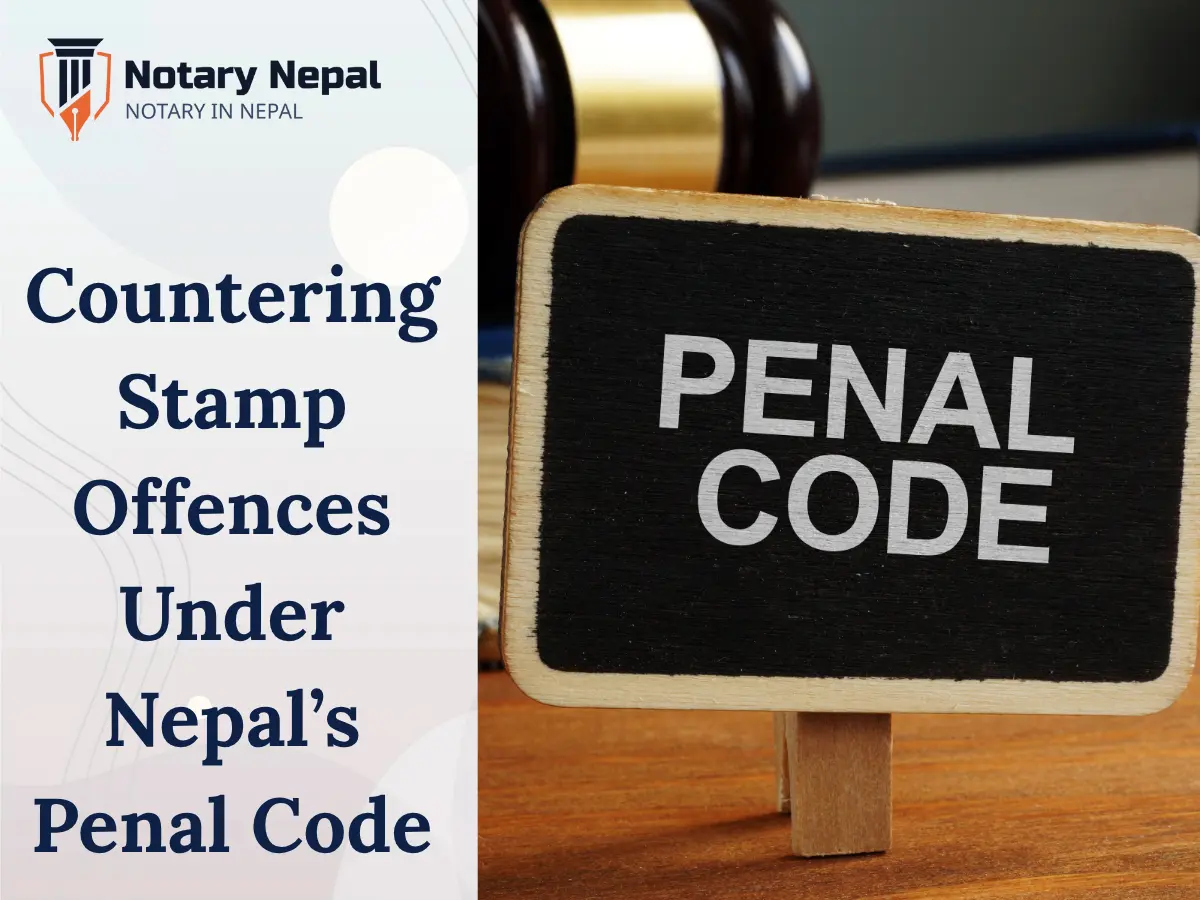

Table of Contents
Introduction
In Nepal, official documentation remains the bedrock of legal, administrative, and financial operations. Whether it’s tax documents, property deeds, contracts, or court filings, stamps—both revenue and postal—serve as evidence of authenticity and validity. However, as with any valuable item, stamps are vulnerable to misuse and counterfeiting. To combat this, Nepal’s National Penal (Code) Act, 2017 introduces comprehensive provisions under the chapter titled Offences Relating to Stamps (Sections 267–272), which provides a strong legal framework to uphold the sanctity of these instruments.
Understanding the scope, penalties, and procedures related to stamp offenses is essential for individuals, businesses, and legal practitioners. In this guide, we’ll explore Nepal’s legal stance on stamp-related crimes and offer practical advice to remain compliant.
What Are Stamps in the Legal Context?
Under Nepal’s Penal Code, the term “stamps” covers both postal stamps used for correspondence and revenue stamps required for official documents like contracts, property deeds, and judicial papers. Their function extends beyond mere postage; they represent governmental validation.
Counterfeit Stamp – Defined
A counterfeit stamp refers to an unauthorized imitation of a genuine stamp. This can take many forms:
Completely forged stamps intended to be passed off as real.
Used stamps that have been altered or erased.
Digital reproductions or scans meant to mimic authentic stamps.
Key Sections on Stamp Offences in the Penal Code
Section 267: Prohibition of Counterfeiting Stamps
This section is the foundation of Nepal’s anti-counterfeiting stance. It criminalizes the following:
Making or attempting to make counterfeit stamps
Importing or exporting counterfeit stamps
Selling, purchasing, exchanging, or possessing fake stamps with the intent to use them as genuine
Penalty:
Imprisonment for up to 5 years
Fine up to NPR 50,000
Or both
Section 269: Prohibition of Re-Using Stamps
Any attempt to re-use a stamp that has already served its official purpose is illegal. This includes:
Using a previously used stamp
Erasing or modifying a cancellation mark to fake originality
Penalty:
Imprisonment up to 1 year
Fine up to NPR 10,000
Or both
Section 270: Removing Stamps from Public Documents
It is illegal to remove a stamp from an official document for reuse or any other fraudulent purpose.
Penalty:
Imprisonment up to 6 months
Fine up to NPR 5,000
Or both
Section 271: Forfeiture of Tools and Materials
If found guilty, the offender’s equipment, tools, or materials used for producing fake stamps will be seized and confiscated by the government.
Section 272: Statute of Limitations
Legal proceedings for stamp-related offenses must be initiated within 1 year of discovering the offense.
Visual Table: Summary of Offences and Penalties
| Offense | Section | Penalty (Imprisonment) | Penalty (Fine) |
|---|---|---|---|
| Counterfeiting stamps | 267 | Up to 5 years | Up to NPR 50,000 |
| Reusing previously used stamps | 269 | Up to 1 year | Up to NPR 10,000 |
| Removing stamps from public documents | 270 | Up to 6 months | Up to NPR 5,000 |
| Failing to report or prosecute within deadline | 272 | Case inadmissible | N/A |
Technological Advancements and Digital Counterfeiting
While the Penal Code mainly addresses physical counterfeiting, digital forgery is an emerging concern. With tools like high-resolution scanners and editing software, even digital documents can be manipulated to include fake stamps.
Recommended Measures:
Government agencies should introduce QR-code embedded stamps.
Legal institutions can maintain a centralized stamp verification database.
Citizens should always check the authenticity of stamps on their documents.
Legal Process: Filing Complaints & Taking Action
If you suspect a document contains a counterfeit stamp, follow these steps:
File a complaint at your local police station or District Administration Office (DAO).
Provide evidence: Present the suspicious document along with any transactional records.
Cooperate with Investigation: If needed, appear before the prosecutor or investigative authority.
Note: As per Section 272, your complaint must be filed within one year of discovering the offense.
Real-Life Implications of Stamp Misuse
Stamp-related offenses can cause significant issues:
Property fraud: Fake stamps on deeds can lead to loss of ownership.
Contract invalidation: Agreements using reused stamps may be deemed void.
Tax evasion: Unauthorized reuse of revenue stamps cheats the government.
Businesses, law firms, and notaries should conduct regular audits of their stamp usage and educate their teams about legal protocols.
Prevention and Awareness
To avoid legal troubles, here are some best practices:
Always purchase stamps from authorized vendors.
Never reuse stamps even if they appear intact.
Store unused stamps securely.
Check the watermark, serial number, and cancellation marks.
Report suspicious activities to authorities immediately.
Legal Consultation and Notary Support
Understanding the law is essential, but when in doubt, seek professional assistance. Notaries and legal experts can help:
Verify the authenticity of stamps
Assist in filing legal complaints
Guide you through the compliance process
If you're seeking reliable notary services in Nepal, consider reaching out to licensed firms such as Notary Nepal, who offer both in-person and online notarization, translation, and document authentication services.
Conclusion
Nepal’s Penal Code takes a stringent and structured approach to safeguard the authenticity of official documents through stamp-related provisions. With Sections 267–272 offering a strong legal framework, the law seeks to protect citizens, institutions, and the state from fraud, forgery, and exploitation.
As stamp counterfeiting methods evolve with technology, awareness, compliance, and timely legal action remain your best tools for defense. Whether you're an individual or organization, respecting these regulations helps preserve the integrity of Nepal’s legal and administrative systems.
If you have doubts about your documents or suspect fraudulent activity, consult a notary or legal advisor immediately.
Need help verifying or notarizing documents? Visit https://notarynepal.com or contact +977 9765979296 for expert notary and translation services in Nepal.
This article is for informational purposes only and does not constitute legal advice, advertisement, or solicitation. Notary Nepal and its team are not liable for any consequences arising from reliance on this information. For legal advice, please contact us directly.


